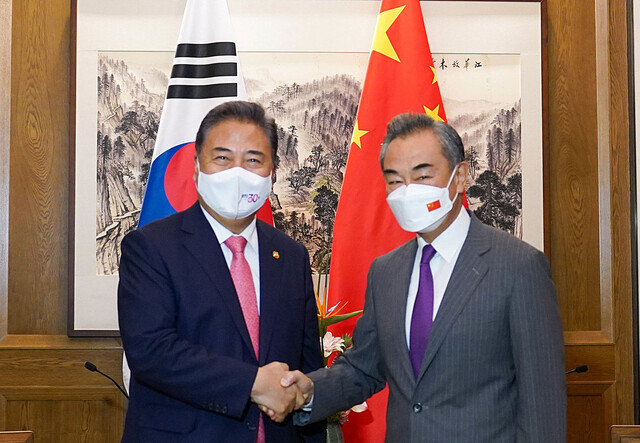hankyoreh
Links to other country sites 다른 나라 사이트 링크
Top diplomats of S. Korea, China talk semiconductors and THAAD

South Korean Foreign Minister Park Jin is currently carrying out his first official visit to China ahead of the 30th anniversary of the establishment of diplomatic ties between the two countries on Aug. 24. Park met with his counterpart, Chinese Foreign Minister Wang Yi, on Tuesday in Qingdao, Shandong Province.
To mark the 30th anniversary of the establishment of diplomatic relations, Park stressed that South Korea and China should form a “cooperative relationship that pursues common interests based on mutual respect.”
Wang Yi reportedly noted that for the next 30 years of South Korea-China relations, both sides should “maintain independence and self-reliance,” and “avoid external obstacles and influences,” while taking into consideration the concerns held by their counterpart.
During subsequent talks, the two ministers appear to have focused on diplomatic and security issues, including the current situation on the Korean Peninsula centered around the North Korean nuclear issue, the USFK’s deployment of the THAAD anti-missile system, and “Chip 4” — a US-led semiconductor supply chain dialogue involving the US, South Korea, Japan and Taiwan.
Regarding Chip 4, an issue that China has been wary of, Park reportedly informed Wang that South Korea has decided to attend the preliminary meeting of the initiative and emphasized that it was “a judgment based on [Korea’s] national interests and is not intended to exclude or target any specific country.”
“Regarding similar issues, going forward our government will be making decisions based on our national interest,” Park said.
In relation to this, Wang shared Beijing’s view, stating at a meeting later that day that the two countries should “maintain stable and smooth production and supply chains, adhere to equality and respect and non-interference in each other’s internal affairs.”
Regarding the situation on the Korean Peninsula, Park stressed that an “unprecedented crisis” has continued due to North Korea’s continuous provocative actions of late and requested for China to play an active role in order for North Korea to return to dialogue instead of continuing with its provocations.
In response, Wang said China would continue to play a constructive role as much as possible but also emphasized the importance of US-North Korea relations, expressing disappointment at the “passive attitude” of the US concerning North Korea.
Park and Yi also seem to have relatively clearly stated their country’s respective positions regarding the THAAD issue. Both did agree, however, that the issue should not become an obstacle to the further development of South Korea-China relations in the future.
At the expanded meeting that followed, the two sides focused talks on how to further develop bilateral ties on the occasion of the 30th anniversary of the establishment of diplomatic relations between South Korea and China.
The two ministers decided to hold a vice-ministerial level diplomatic and security dialogue in Seoul later this year and came to a strong consensus on the importance of high-level communications, including summit-level diplomacy.
By Jung In-hwan, staff reporter
Please direct questions or comments to [english@hani.co.kr]

Editorial・opinion
![[Editorial] Yoon must halt procurement of SM-3 interceptor missiles [Editorial] Yoon must halt procurement of SM-3 interceptor missiles](https://flexible.img.hani.co.kr/flexible/normal/500/300/imgdb/child/2024/0501/17145495551605_1717145495195344.jpg) [Editorial] Yoon must halt procurement of SM-3 interceptor missiles
[Editorial] Yoon must halt procurement of SM-3 interceptor missiles![[Guest essay] Maybe Korea’s rapid population decline is an opportunity, not a crisis [Guest essay] Maybe Korea’s rapid population decline is an opportunity, not a crisis](https://flexible.img.hani.co.kr/flexible/normal/500/300/imgdb/original/2024/0430/9417144634983596.jpg) [Guest essay] Maybe Korea’s rapid population decline is an opportunity, not a crisis
[Guest essay] Maybe Korea’s rapid population decline is an opportunity, not a crisis- [Column] Can Yoon steer diplomacy with Russia, China back on track?
- [Column] Season 2 of special prosecutor probe may be coming to Korea soon
- [Column] Park Geun-hye déjà vu in Yoon Suk-yeol
- [Editorial] New weight of N. Korea’s nuclear threats makes dialogue all the more urgent
- [Guest essay] The real reason Korea’s new right wants to dub Rhee a founding father
- [Column] ‘Choson’: Is it time we start referring to N. Korea in its own terms?
- [Editorial] Japan’s rewriting of history with Korea has gone too far
- [Column] The president’s questionable capacity for dialogue
Most viewed articles
- 1Months and months of overdue wages are pushing migrant workers in Korea into debt
- 2At heart of West’s handwringing over Chinese ‘overcapacity,’ a battle to lead key future industries
- 3[Editorial] Yoon must halt procurement of SM-3 interceptor missiles
- 4Fruitless Yoon-Lee summit inflames partisan tensions in Korea
- 5Trump asks why US would defend Korea, hints at hiking Seoul’s defense cost burden
- 6Dermatology, plastic surgery drove record medical tourism to Korea in 2023
- 71 in 3 S. Korean security experts support nuclear armament, CSIS finds
- 8[Editorial] New weight of N. Korea’s nuclear threats makes dialogue all the more urgent
- 9South Korea officially an aged society just 17 years after becoming aging society
- 10[Column] For K-pop idols, is all love forbidden love?